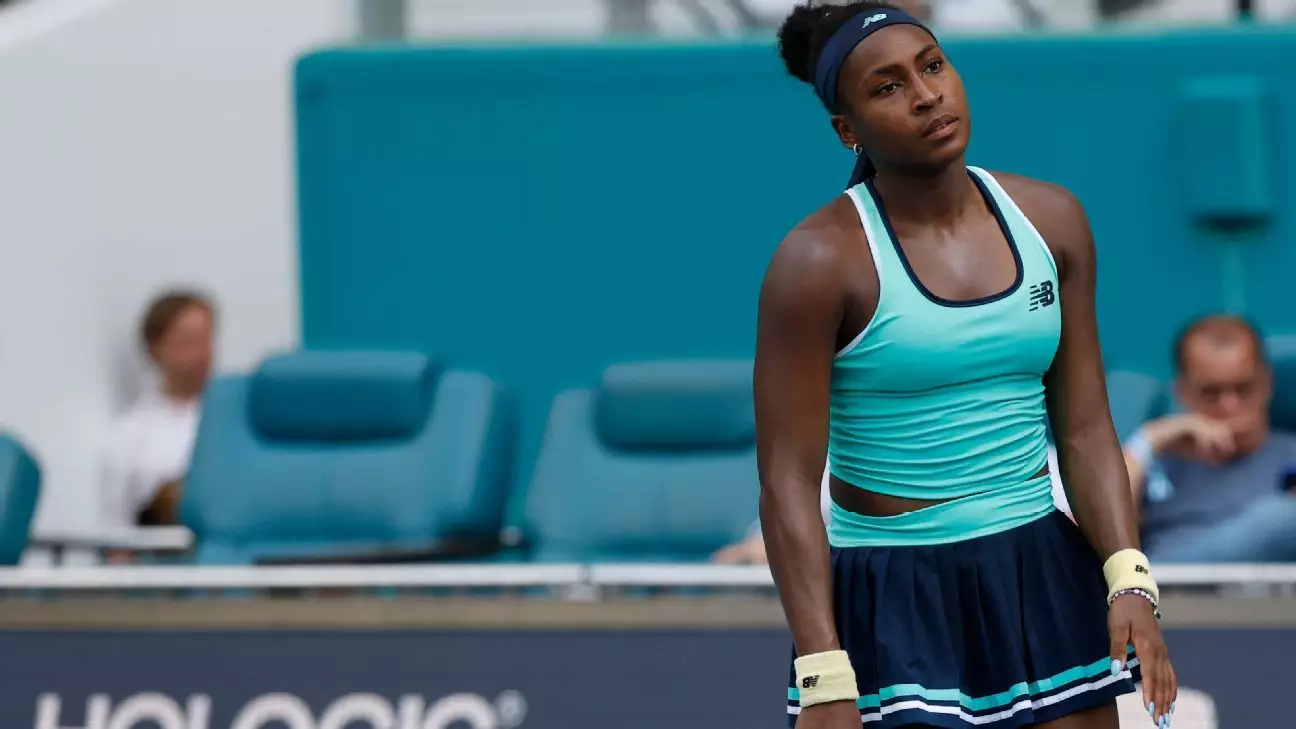In a shocking turn of events at the Miami Open, No. 3 seed Coco Gauff succumbed to an unseeded Magda Linette in a straight-sets loss, marking a disappointing day for American women’s tennis. Gauff’s struggle was particularly evident in her serve, where she recorded an astonishing 12 double faults—a staggering number for any professional player, let alone a talent of her caliber. Conceding half of her first serves into play while racking up unforced errors, Gauff’s performance highlighted the pressure that comes with high expectations, especially in front of a home crowd.
The atmosphere was electric in South Florida as Gauff took a fleeting lead of 4-3 in the second set, igniting hope among her fans. Still, Linette stayed composed, leveraging Gauff’s serving woes to clinch a pivotal victory. For Linette, this win marked her first against a top-three player since 2021 and resonated as a testament to her perseverance and tactical awareness. “It was really important for me to keep pressing Coco’s serve to make sure she feels the pressure,” Linette noted, revealing her strategic mindset in a high-stakes match.
A Day of Disappointments for American Players
Gauff’s defeat was not an isolated incident; it encapsulated a broader narrative of struggles faced by American women in this tournament. Defending champion Danielle Collins, along with other hopefuls like Amanda Anisimova and Ashlyn Krueger, were also eliminated in straight sets, signaling a rough patch for U.S. tennis. This lack of success may raise questions about the current state and future of American women’s tennis prowess on a global scale.
The success these players had previously garnered is now overshadowed by their recent shortcomings, reflecting how quickly fortunes can change in the sport. In a competitive field, maintaining top performance is no small feat, and this tournament illuminated the disparities that can arise between expectations and outcomes.
Strong Contenders Rise
On the other side of the draw, the tournament continued to exhibit extraordinary talent. Aryna Sabalenka, the top seed and reigning world No. 1, continued to demonstrate why she holds her position with fervent authority. Winning straightforwardly against Collins, Sabalenka showcased a staggering 23 winners, including seven aces. Her tenacity and strategic play set her apart as a formidable competitor as she marches into the quarterfinals.
She is poised to meet Qinwen Zheng next, who herself advanced after overcoming Krueger. Given Zheng has not previously triumphed against Sabalenka in their five encounters, the expectations surrounding this matchup lean heavily in favor of the Belarusian. The mounting pressure in such key matches often leads to either triumphant affirmations or painful revelations of inadequacies.
Emerging Stars and Rising Tensions
Moreover, former Miami Open champion Iga Swiatek’s resilience was on display as she edged out Ukraine’s Elina Svitolina in what turned out to be a nail-biter of a match. After a tense first set that ended in a tiebreak, Swiatek sealed her victory with a decisive second set, indicating that she remains a potent threat in the tournament. As she advances, her path includes a promising matchup against Alexandra Eala, a young Filipino wildcard who capitalized on her opponent’s withdrawal due to injury.
Furthermore, Jessica Pegula stands as the last American woman remaining in the draw after a convincing win against Marta Kostyuk. Her performance is marked by determination and skill, setting her up for a challenging quarterfinal against Emma Raducanu, a former US Open champion determined to prove her mettle on the Masters 1000 stage. Their upcoming clash promises to be not only a test of technique but also a duel of willpower and strategic depth.
Conquering Challenges
The Miami Open has undeniably highlighted the ebb and flow of success in tennis, illustrating that triumph can quickly shift to defeat in a matter of points. As players navigate an emotionally and physically demanding landscape, the experiences gleaned from each match—whether disappointment or joy—shape their careers and aspirations. The takeaway is that every setback is merely a stepping stone on the quest for greatness, and resilience remains the ultimate test of character in sports.


Leave a Reply